317 medical school graduates will start their residency training in one of IU’s 38 accredited residency programs this year.
Margaret Nickerson felt the nervous energy of Match Day all around her as she and her peers in the Indiana University School of Medicine Class of 2025 counted down the seconds to noon — the time of the big reveal.
As she opened her envelope to discover what her next four years would hold, Nickerson’s eyes landed on her “match” — Indiana University School of Medicine, Neurology Residency.
Her anxiety turned to excitement and settled into gratitude. “I love IU because I feel like I am part of a team that is invested in my growth and is committed to helping me further my personal and professional career goals,” she said.
Nickerson is among 354 students in the Class of 2025 who will gain the well-earned credential, MD, at the school’s graduate recognition ceremony on May 16. But graduating from medical school is only the beginning. To become practicing physicians, graduates must complete residency programs lasting from three to seven years, and many follow their residencies with a specialized fellowship program. To become a neurosurgeon, for example, takes at least eight years of training after medical school graduation.
As Indiana’s only allopathic, or MD-granting, medical school, IU plays a major role in training the state’s overall physician workforce, including primary care doctors and specialists. The state’s only other medical school, the Marian University Wood College of Osteopathic Medicine, grants DO degrees to about 150 students each year.
Nickerson is among 90 IU School of Medicine graduates and 317 total incoming residents who will start their residency training at IU this year. New residents are coming to IU from 35 states and internationally to train in their chosen specialties.
IU School of Medicine’s impact: By the numbers
Where medical students go for their residency training influences where they ultimately end up practicing. According to the Association of American Medical Colleges’ most recent report on physician retention, nearly half of all licensed U.S. physicians practice in the state where they completed medical school or residency.
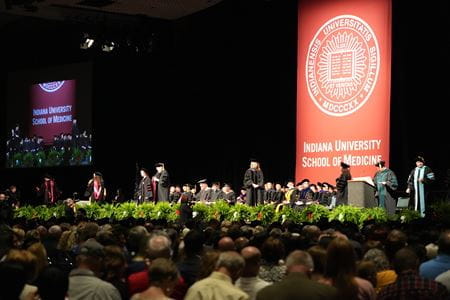 The IU School of Medicine has 38 accredited residency programs, plus 128 accredited and unaccredited fellowship programs for specialized training post-residency.
The IU School of Medicine has 38 accredited residency programs, plus 128 accredited and unaccredited fellowship programs for specialized training post-residency.
In its Indiana Medical Education Pipeline-to-Practice Study, the IU Bowen Center for Health Workforce Research and Policy found that 91.7% of Indiana licensed physicians who have completed a residency program in Indiana practiced in the state — 57% in primary care, 6% in psychiatry, 5% in surgical specialties and 32% in other specialties.
According to the Bowen Center’s Indiana Physician Workforce Dashboards, about 27% of all MDs currently practicing in Indiana and its neighboring states were trained at the IU School of Medicine. Among doctors who completed both medical school and a residency or fellowship in Indiana — most through IU programs — 77.5% stay to practice in the state, which is significantly higher than the national average and all bordering states.
The highest physician retention rates among IU School of Medicine graduates were for those who matched into family medicine residencies. IU offers family medicine programs throughout the state — in Lafayette, Indianapolis, Jasper and Muncie.
Indiana needs to boost its primary care physician workforce by 20% over the next five years to keep up with patient needs — part of a national physician workforce shortage. IU ranks among the “Best Medical Schools for Primary Care” by U.S. News and World Report, and ranks high for the most graduates practicing in rural areas and professional shortage areas.
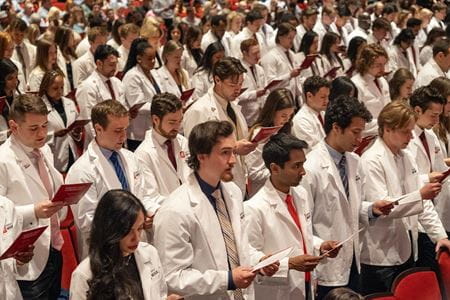
A federal grant is helping IU School of Medicine incentivize primary care careers. Last year, the school awarded 94 students a $20,000 scholarship through the INPACT program for their commitment to enter a primary care field, including internal medicine, pediatrics and family medicine. Among 2025 graduates, 42% matched into a primary care residency.
A survey of recent pediatrics residency graduates from 2022-24 shows 54% stayed in Indiana following their residency. More than a third went directly into primary care practice while the others pursued fellowship training in specialized fields like pediatric critical care, hematology-oncology or pulmonology.
IU trains specialists in many fields. Among the Class of 2025, about 32% matched into a hospital-based residency program and 25% matched into surgical specialties. IU School of Medicine ranks high nationally for its programs in urology, radiology, anesthesiology, neurology and others. Graduate surveys from the Diagnostic Radiology Residency from 2020-24 indicate about 60% stay in Indiana to begin clinical practice or pursue additional subspeciality training at IU.
No place like home: Why IU graduates stay in Indiana
 Andrew Lutz, MD, is an assistant professor of clinical surgery who specializes in abdominal transplant surgery. He did all his training at IU, from undergrad through medical school and specialty training.
Andrew Lutz, MD, is an assistant professor of clinical surgery who specializes in abdominal transplant surgery. He did all his training at IU, from undergrad through medical school and specialty training.
The progression of his journey shows a common pattern: a third-year rotation as a medical student led to work in a lab where he developed relationships with the physicians who inspired his current career.
“The IU transplant program is one of the largest and most comprehensive abdominal programs in the country, and I wanted to learn from the surgeons here,” Lutz said. “They offered me a job during my second year of fellowship, so it was an easy decision to accept a position to continue working with the IU team.”
Nickerson is convinced she will stay in Indiana when she starts practicing as a neurologist. She’s a lifelong Indianapolis resident who enjoys celebrating “all of life’s occasions” with her family in Indiana.
“I’ve also become involved in community organizations during my time spent at IU School of Medicine — the Bloomington and Indianapolis campuses — and the more I get to know the members of the community I live and work in, the more I want to stay and develop those relationships,” she said.
Jayla Ruth is another 2025 graduate who is excited to be staying at IU as an incoming psychiatry resident.
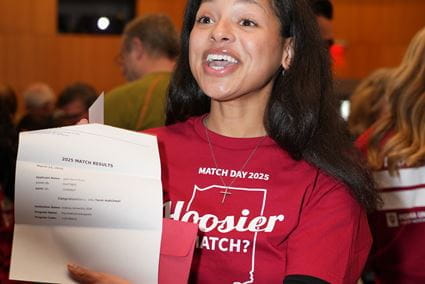 “It’s incredibly meaningful to continue my training in a place where I’ve already built strong relationships and where faculty and residents have consistently gone out of their way to support my growth,” Ruth said.
“It’s incredibly meaningful to continue my training in a place where I’ve already built strong relationships and where faculty and residents have consistently gone out of their way to support my growth,” Ruth said.
She also sees a huge need for mental health professionals in Indiana, where all 92 counties are federally designated as workforce shortage areas. A 2023 IU study determined that untreated mental illness costs Indiana more than $4.2 billion each year.
“I’ve witnessed firsthand the mental health needs across our communities, and I want to be part of the effort to expand access to care, particularly for populations impacted by addiction and systemic barriers,” Ruth said.
2025 graduate Leah Bode is also “thrilled” to be staying at IU for her residency in obstetrics and gynecology.
“IU School of Medicine was my top choice for residency because it was the perfect blend of all the things most important to me for this next stage of training — a strong academic environment with research exposure and collaboration with subspecialists, a meaningful culture of advocacy embedded into the program, proximity to family, and the ability to live with my husband, who is pursuing a PhD at Purdue University,” explained Bode.
Great Match: IU graduates head to top programs elsewhere
About two-thirds of IU School of Medicine’s 2025 graduates will leave Indiana for residency programs in 38 other states. Aditya Belamkar matched into internal medicine at Northwestern University’s top-rated medical school. His long-range goal is to become a cardiopulmonary specialist.
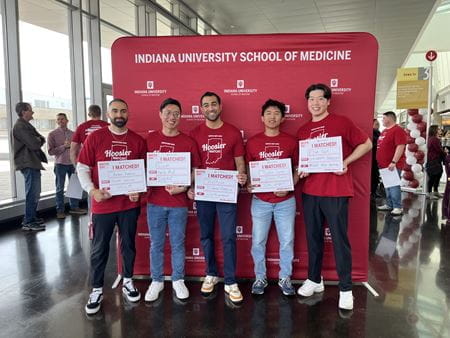 Belamkar said matching to Northwestern was “shocking” due to its reputation and the caliber of its faculty. His IU School of Medicine friend group includes students who matched to other top-ranked programs at the likes of Duke, UCLA, Case Western Reserve and Mount Sinai.
Belamkar said matching to Northwestern was “shocking” due to its reputation and the caliber of its faculty. His IU School of Medicine friend group includes students who matched to other top-ranked programs at the likes of Duke, UCLA, Case Western Reserve and Mount Sinai.
While Belamkar is eager to move to Chicago for his specialty training, he foresees a probable return to the Hoosier state.
“After residency, I can definitely see myself returning to practice here,” he said. “I’m particularly drawn to the opportunity to serve underserved populations in a place that I call home.”
Kevin Gianaris is “absolutely ecstatic” to begin his residency in general surgery at UCLA — he loves the ocean. But the lifelong Hoosier admits it’s likely he’ll be back. He appreciates his medical education at IU and feels confident heading into residency.
“Some notable faculty and residents really focused on teaching and helped me grow,” Gianaris said. “Seeing the change in the kind of clinician I was from the beginning of my third year to the end of my fourth year is a testament to how much progress can be made.”
 Meghan Russell, a 2025 IU School of Medicine graduate, is heading to the University of Michigan to start her residency in neurology at the same time her older brother, Lt. Patrick Russell, DO, begins his neurology residency at IU. Both siblings were inspired by their mother, Paula Toth-Russell, MD, a 1990 IU School of Medicine graduate who also completed her neurology residency at IU.
Meghan Russell, a 2025 IU School of Medicine graduate, is heading to the University of Michigan to start her residency in neurology at the same time her older brother, Lt. Patrick Russell, DO, begins his neurology residency at IU. Both siblings were inspired by their mother, Paula Toth-Russell, MD, a 1990 IU School of Medicine graduate who also completed her neurology residency at IU.
Patrick joined the military’s Health Professions Scholarship Program while in medical school in Bradenton, Florida, and became a Navy flight surgeon, stationed in Virginia Beach. After completing his military commitment, he decided to participate in the National Residency Matching Program and matched to IU for neurology — his top pick as a South Bend, Indiana, native who earned his bachelor’s degree from IU in 2015.
“I wanted to come to IU first and foremost because it is an excellent program that trains competent and proficient neurologists,” he said, adding, “I love the state, and I was so happy to finally be able to come a bit closer to home after spending the last eight years mostly on the coasts.”
Not from around here: IU welcomes incoming trainees
While some of its 2025 graduates head out of state for residency, IU School of Medicine will gain 227 new residents this year from 125 other medical schools throughout the nation and internationally.
Victoria Morrill is an incoming pediatrics resident from Chicago Medical School. She wanted to be at a top-rated children’s hospital and stay in the Midwest close to her friends and family. Wish granted.
“Riley Hospital for Children excels in many pediatric subspecialties,” Morrill said. “I just had a gut feeling that I would not only fit in well here but also have so many opportunities to excel. I am definitely interested in staying at Riley for a fellowship after residency and possibly remaining afterwards, as well.”
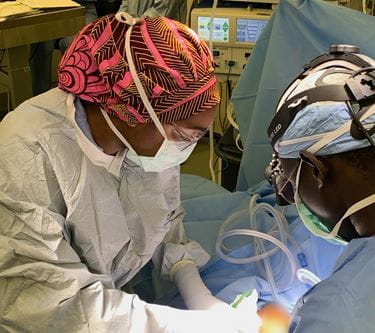 Jasmin Lee, MD, grew up in Dayton, Ohio, and earned her medical degree from the University of Cincinnati before coming to IU for residency. Now in her fifth year of surgery training, Lee has a passion for teaching and advocates for equitable care and representation in surgical fields.
Jasmin Lee, MD, grew up in Dayton, Ohio, and earned her medical degree from the University of Cincinnati before coming to IU for residency. Now in her fifth year of surgery training, Lee has a passion for teaching and advocates for equitable care and representation in surgical fields.
“As a trainee from an underrepresented background and as a woman in a male-dominated field, I can confidently say that my experience at IU has been overwhelmingly positive and encouraging,” said Lee, who is now applying to the pediatric surgery fellowship based at Riley Hospital and other fellowship programs. “The faculty are genuinely passionate about helping me become the best surgeon I can be.”
For Class of 2025 graduates Austin and Kylee Darden, who married right before they started medical school, IU School of Medicine is an important part of their journey to become orthopedic surgeons. Originally from North Georgia, they are now heading back to the South for residency training at LSU Health New Orleans School of Medicine.
Trying to match into the same specialty program through the Couples Match limited their odds — LSU offers just four spots each year in its Orthopaedic Surgery Residency. The experiences Austin and Kylee gained at IU prepared them well and helped them stand out in the interview process.
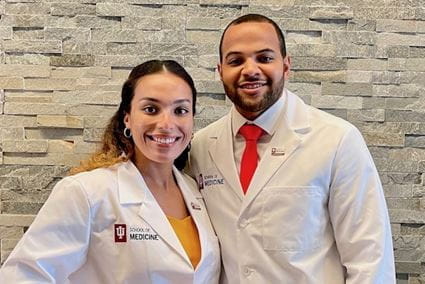
“I believe IU has provided me with a strong foundation to support my residency training,” Austin said. “Rotating through major hospitals in Indianapolis such as Methodist, Eskenazi, Riley and the VA, along with smaller clinics throughout the state, has given me excellent experience.”
“One of the biggest things I will carry with me from medical school is the amazing relationships that I was able to make,” added Kylee. “This includes personal friendships and relationships with my amazing career and research mentors. I will always carry the knowledge — medical and otherwise — that I have gained from my education and training here at IU School of Medicine.”
